
When you have a team of developers working remotely, it can be easy to think they’re not as productive as those working in an office.
After all, what’s stopping them from watching TV all day rather than working on your project?
In fact, the opposite is true.
That’s why in this article, we’re giving six good reasons remote work is a win-win for both employers and employees.
Table of Contents
Increased productivity
When developers work from home, they’re more productive than when they work in an office, according to a Terminal’s study that analyzed the productivity of more than a thousand engineers.
The study found that 68% of developers can get more meaningful work done when not subject to the distractions of the office environment, while 32% said they’re more productive in an office setting.
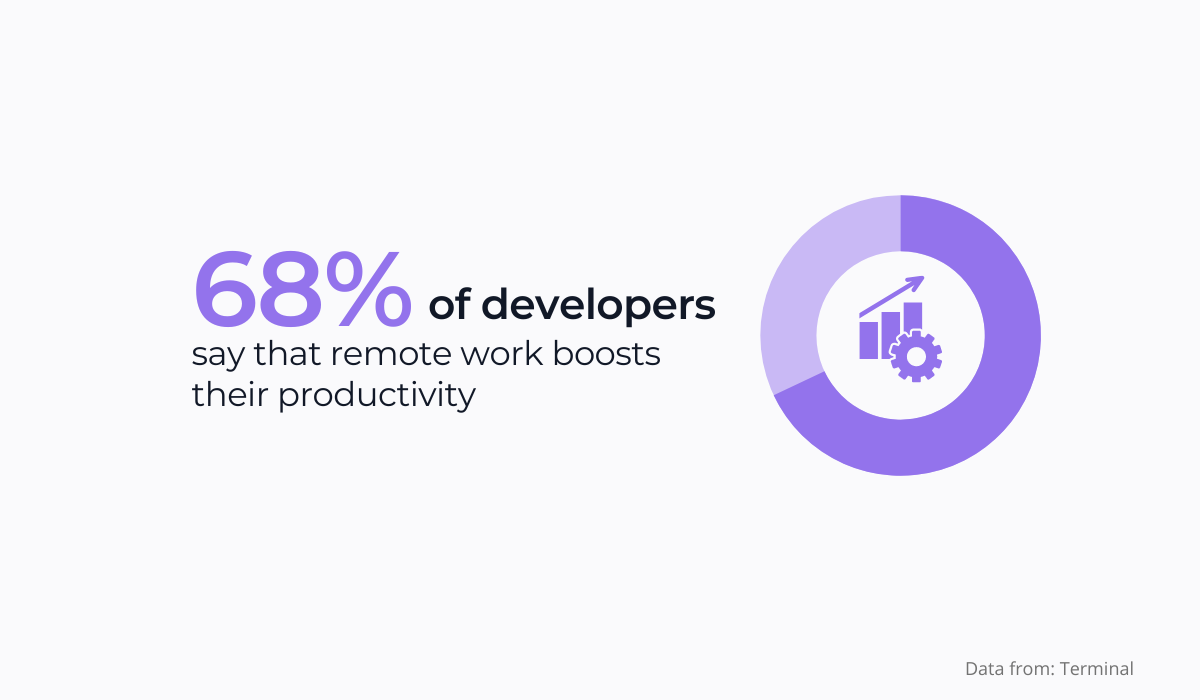
Terminal’s CEO Clay Kellogg thinks these findings come as no surprise and points out:
“It’s clear that the majority of engineers are happier working remotely and feel remote enables them to be more productive and effective in their roles.”
In an office environment, it can be difficult to focus on your work when you’re surrounded by noise, phone conversations, endless meetings, and a constant stream of people passing by.

Get unreal data to fix real issues in your app & web.
According to Chris Parnin, a principal researcher at Microsoft, when developers are interrupted, they can spend a significant amount of time getting back into the groove of things.
In fact, after analyzing 10,000 recorded programming sessions, he found that it took developers 10-15 minutes to start writing code after being interrupted.
He further explains that in an office setting, a developer usually gets only about two hours a day of uninterrupted time to work on a project.

And that can leave its mark on their productivity.
That doesn’t mean that remote work comes without its set of interruptions such as constant email notifications, Zooms video calls, Slack messages, family conversations, or even children running around.
However, once developers learn how to set boundaries and deal with the distractions of home, they usually find that working remotely is one of the best ways to get more done.
Less commute-induced stress
Studies have shown that commuting is one of the most stressful parts of a job, and developers are no exception.
The daily slog to work can have a negative impact on their mental and physical well-being.
This is no surprise if you consider that, on average, commuters spend nearly an hour each day in traffic and waste approximately 30 days a year just sitting in their cars or other means of transportation.
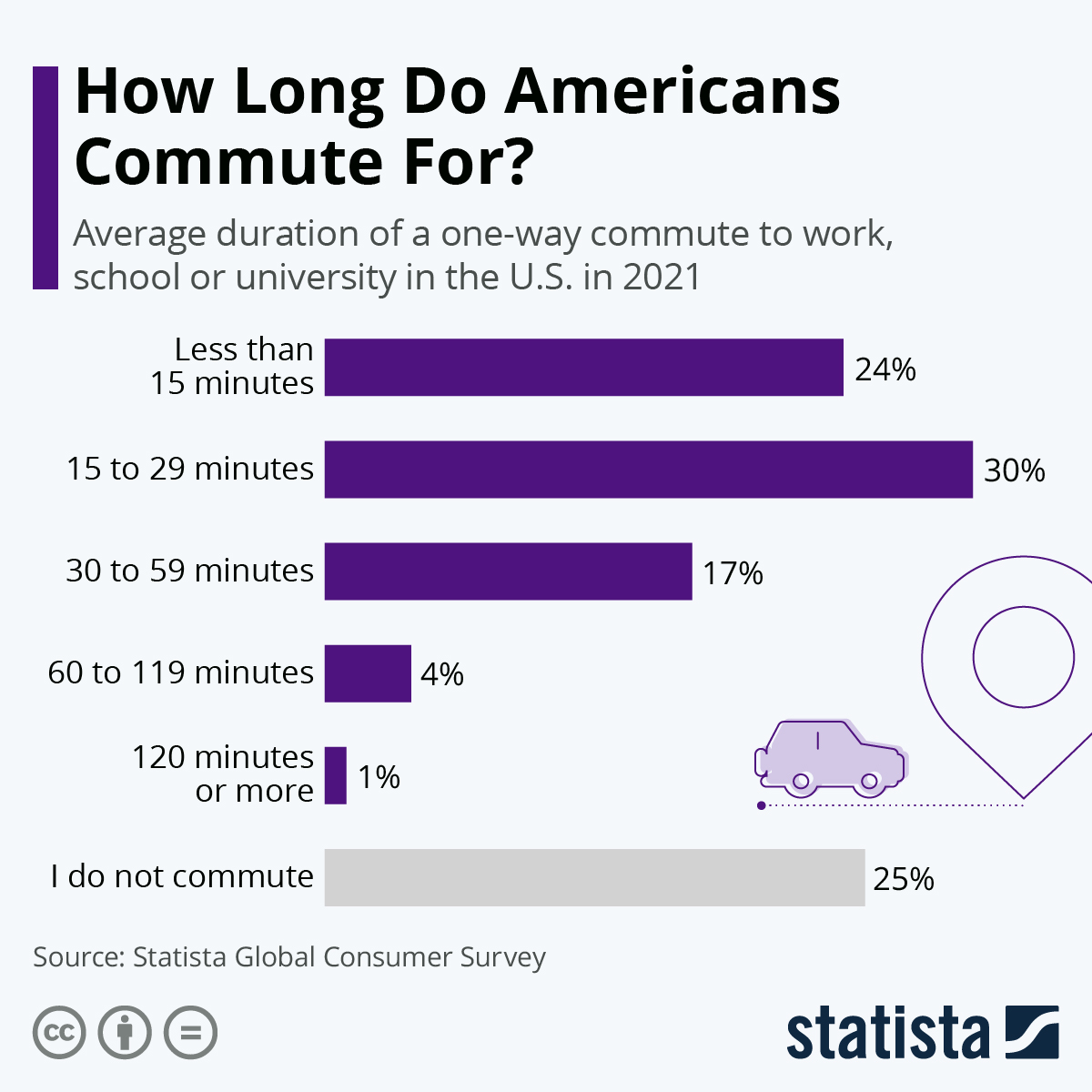
Those long hours spent in traffic are taking a toll on the mental health of software developers and other professionals with long commutes—the longer your commute, the more likely you are to suffer from stress-related issues.
No wonder remote employees repeatedly mention the lack of commute as one of the biggest advantages of working from home.
Remote work allows developers to dedicate all those hours that would have been spent commuting to writing code or some other activity important for their well-being.
For example, before working remotely, John Pearson, a senior vice president at PTC, a Boston software company, used to get up very early each morning in order to be out of his driveway and on his way to work by six.
Otherwise, it would take him more than an hour to get to work, which is definitely more time-consuming than a short walk down the hall to his home office.
While Pearson sometimes still goes to the office, Rashmi Bhankhede, a senior software engineering manager at Capital One, is a big advocate of working remotely exclusively.
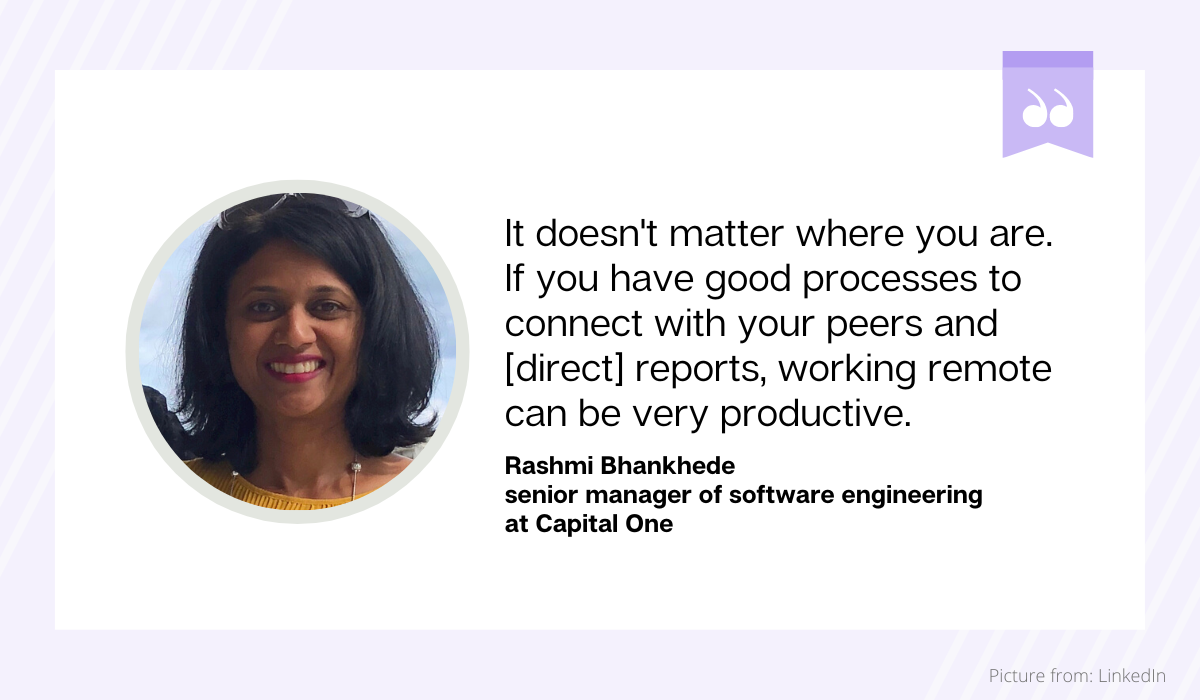
As she no longer needs to commute to work, she has more time to spend with her children and learn new hobbies, such as gardening and sewing. She says:
“I started growing peppers and tomatoes and cucumbers… and got back into sewing.”
As you can see, eliminating long commutes allows developers to spend more time at home, where work-related stress is less likely to interfere with their personal lives.
Employees who enjoy a better work-life balance are more productive and happier overall, so allowing them to reduce their commutes will help your company’s bottom line as well as employee satisfaction.
Lower office costs
Having a physical workplace can be expensive.
A location that has appealing architecture and is fitted out with top-of-the-line technology infrastructure and systems can cost you a lot.
Add in startup costs such as furniture and IT investments, then factor in utilities, internet, phone bills, and maintenance—all these expenses can add up quickly.
For example, in February 2022, NVIDIA unveiled its new building called Voyager. The futuristic structure is part of the company’s Santa Clara headquarters campus.

The construction of the building reportedly cost 370 million dollars, which is not a small amount.
But it’s not only constructing or buying office space that’s costly. Renting can also be a huge factor in a company’s budget.
If you have an office in San Francisco, New York, or another major city with high commercial rent, you know how much of a toll it can take on a company’s expenses.
In fact, according to Capgemini Research Institute, companies with remote working models can reduce operational costs by an impressive one-third.
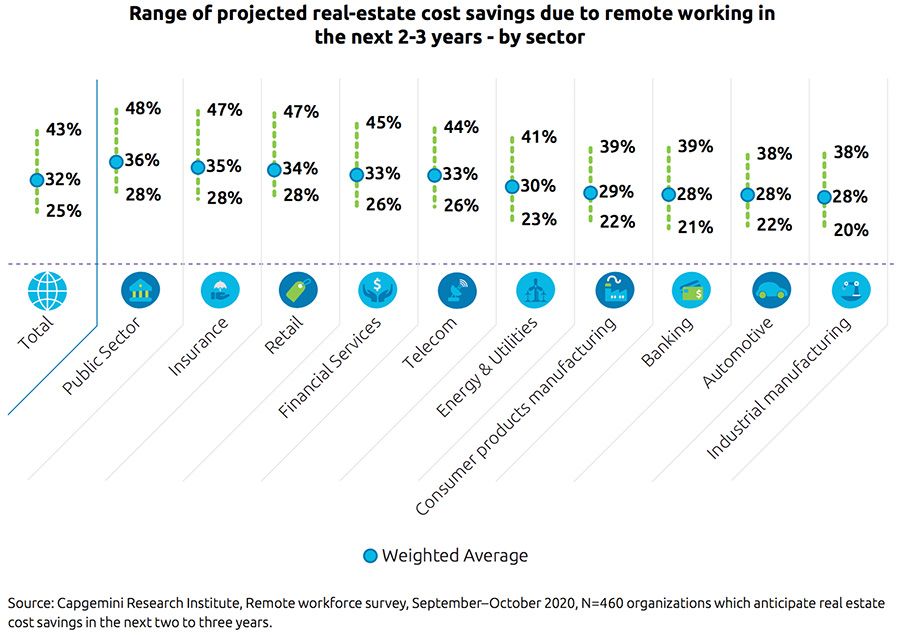
After the COVID-19 pandemic, many companies have begun to move toward remote work models.
And surprisingly, these firms are now seeing lower office costs as a result of this transition.
To illustrate better just how much can be saved by switching to work from home, here are a few cost-saving results from three well-known companies:
- Aetna reduced its office space by 2.7 million square feet, resulting in annual savings of $78 million
- IBM saved $50 million in annual real estate costs.
- McKesson reduced its real estate costs by $2 million per year.
On that note, allowing your employees to work remotely can keep a lot of money in the company’s pocket.
When they’re not trapped by the expense of maintaining a brick-and-mortar office, companies can reinvest that money to expand their businesses, organize team-building activities for their remote teams, or even give everyone bonuses.
Either way, everyone wins!
Scheduling flexibility
One of the biggest attractions of a remote job for developers is having a flexible schedule, the ability to work whenever they want.
Many people find that when they work in an office, they’re restricted to working during certain hours, in most cases from 9 to 5.
And not all of them are at the peak of their productivity at the same time, as you can see in the picture below.
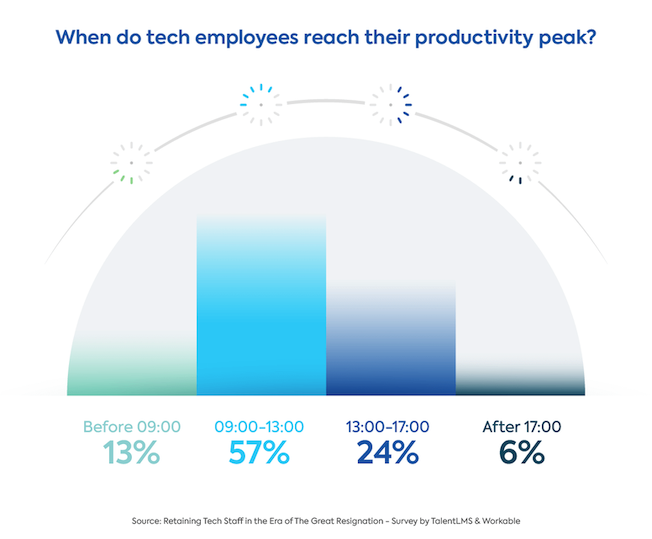
Therefore, sliding working hours allows remote developers to be more productive: some might prefer working in the afternoon or evening, while others may be early risers and want to get up and start working as soon as possible.
In fact, remote employees like the idea of flexible working hours so much that they’re ready to quit their jobs if the company decides to restrict this option.
That’s exactly what Ryan Bernsten, a senior copy manager at AdRoll, did.
After learning that his former employer would require him to return to the office a few days a week, he immediately began searching for a job that would allow him to work remotely and offer more flexibility.
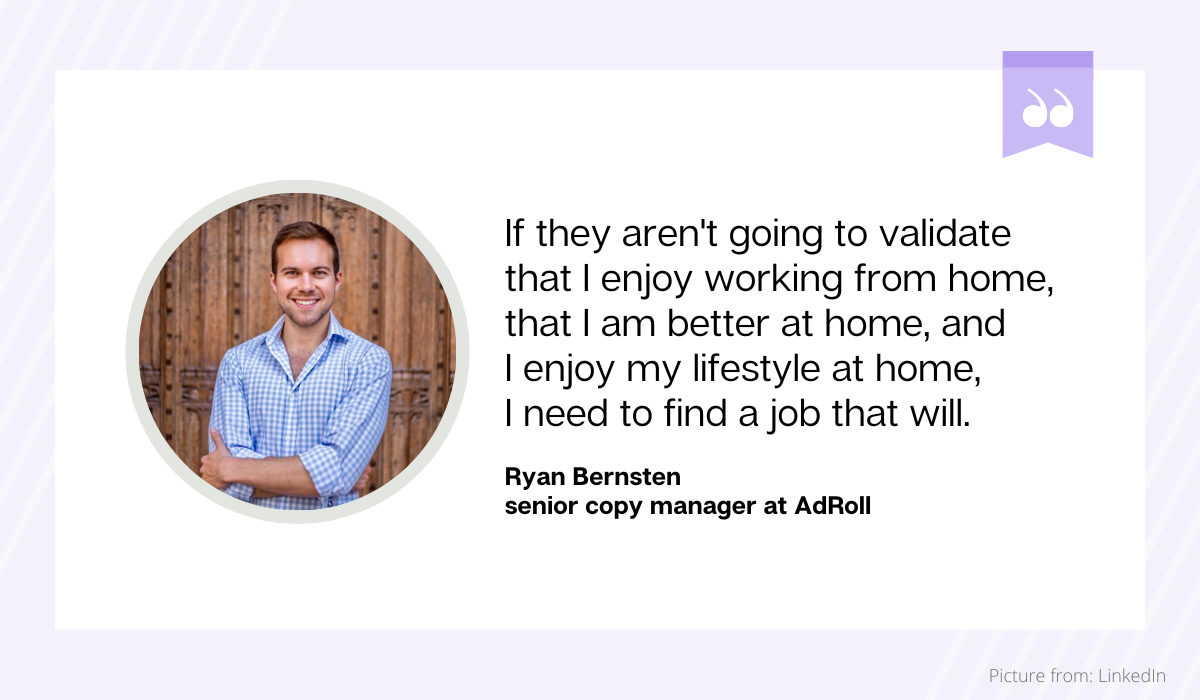
He is not isolated in this decision.
In a recent survey, more than half of employees stated that they now value more the ability to telecommute and have a more flexible schedule than before the pandemic.
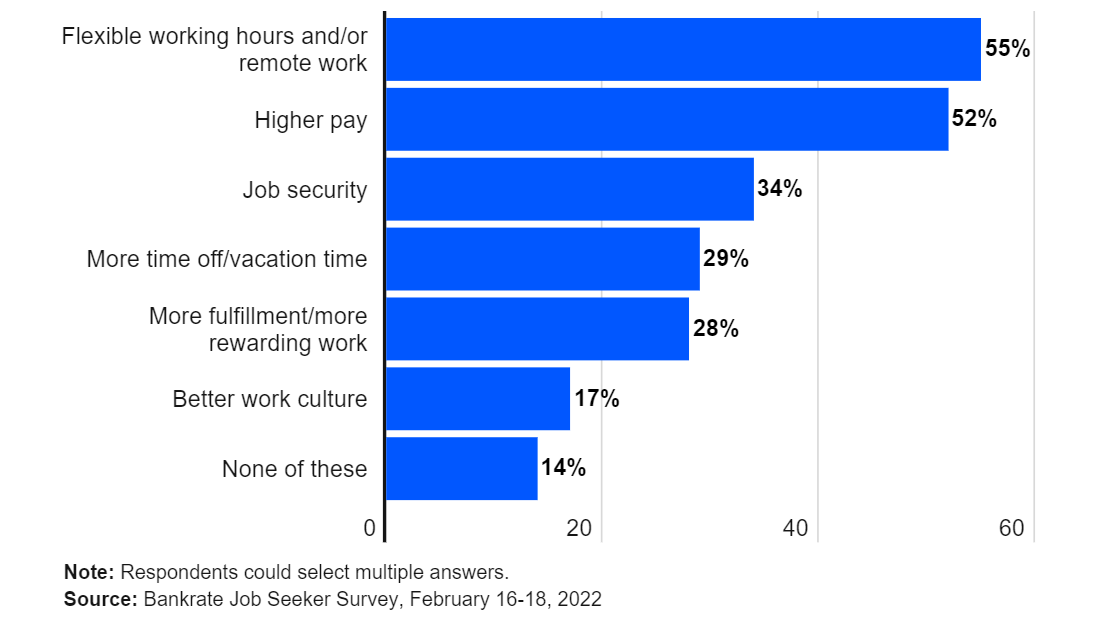
One of the reasons for that is, undoubtedly, better work-life balance.
People like the ability to work where they want, when they want, as long as they get their tasks done.
For example, because of her flexible schedule, Allison Greenwald, a senior product manager at The Alley Group, was able to spend five weeks in Alaska and explore it.
She also visited Austin, Las Vegas, and Utah.

Without the flexibility of remote work, she wouldn’t have the freedom and autonomy to do that.
Flexible working hours also allow employees to be more at home with their families and better balance family life, social life, and professional obligations.
It’s no wonder they can be a decisive factor that can make or break their decision to stay in the company and a reason more to let your developers work flexibly and remotely.
Bigger talent pool
Allowing remote work can also be an excellent way for companies to expand their workforce and hire talented people not located in their city, area, or country.
Recruiting only at a local level will produce a smaller talent pool, and you’ll most likely have to compromise on some of the key requirements you have for your ideal candidate.
Expanding your software team to include applicants from all over the world can give companies qualified developers for any project.
That’s even more important considering that, according to the CoderPad and CodinGame’s global 2022 Tech Hiring Survey, finding qualified candidates is the number one challenge for 47% of recruiters when hiring developers.
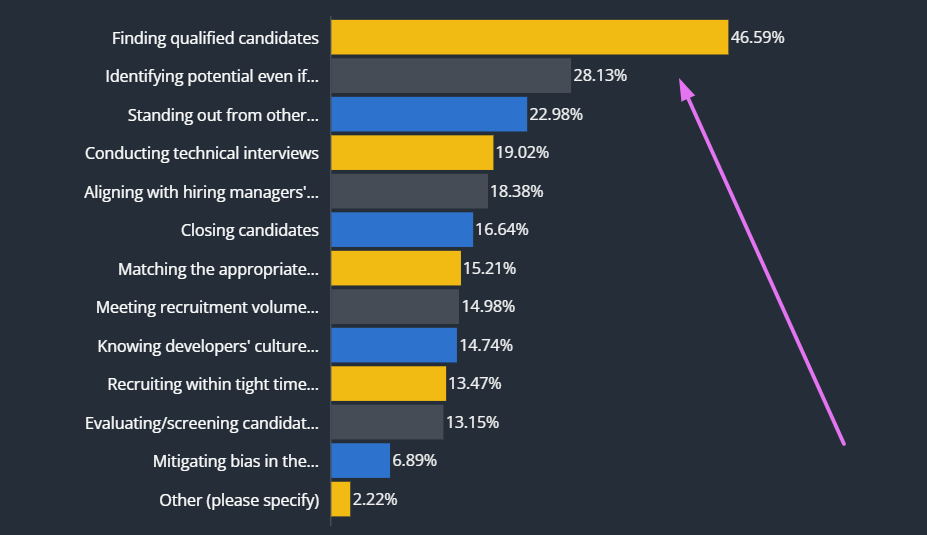
In fact, the shortage of tech professionals is so high that 57% of recruiters are ready to ditch the CVs when hiring, 39% are hiring developers without an academic background, and 40% are looking for candidates internationally.
Amanda Richardson, CEO of CoderPad, states that this unprecedented demand for developers is forcing companies to adjust their hiring processes if they want to compete for talented developers.

And that, as she points out, indicates that the companies have to hire based on skills regardless of the location.
That basically means that if you want to stay competitive in the software development job market, remote work shouldn’t be just a perk but a necessity.
Take Stripe, an online payment processing company, as an example.
The company has hired over a hundred remote developers in the U.S. and abroad. In fact, they were so satisfied with the whole process that their CTO David Singleton, in his blog post, stated:
“We have seen such promising results from our remote engineers that we are greatly increasing our investment in remote engineering.”
Remember, good software developers are hot commodities right now.
With a remote working policy in place, you’ll have access to some of the brightest and most talented minds in software development. And that’s something worth considering.
Increased employee retention
It’s no secret that talent retention is one of the most difficult challenges software development companies face today.
Employees are quick to compare offers and even quicker to move on once they find a better deal elsewhere.
And according to the statistics, if companies don’t offer them a remote work possibility, 30% of tech employees are willing to quit their jobs.
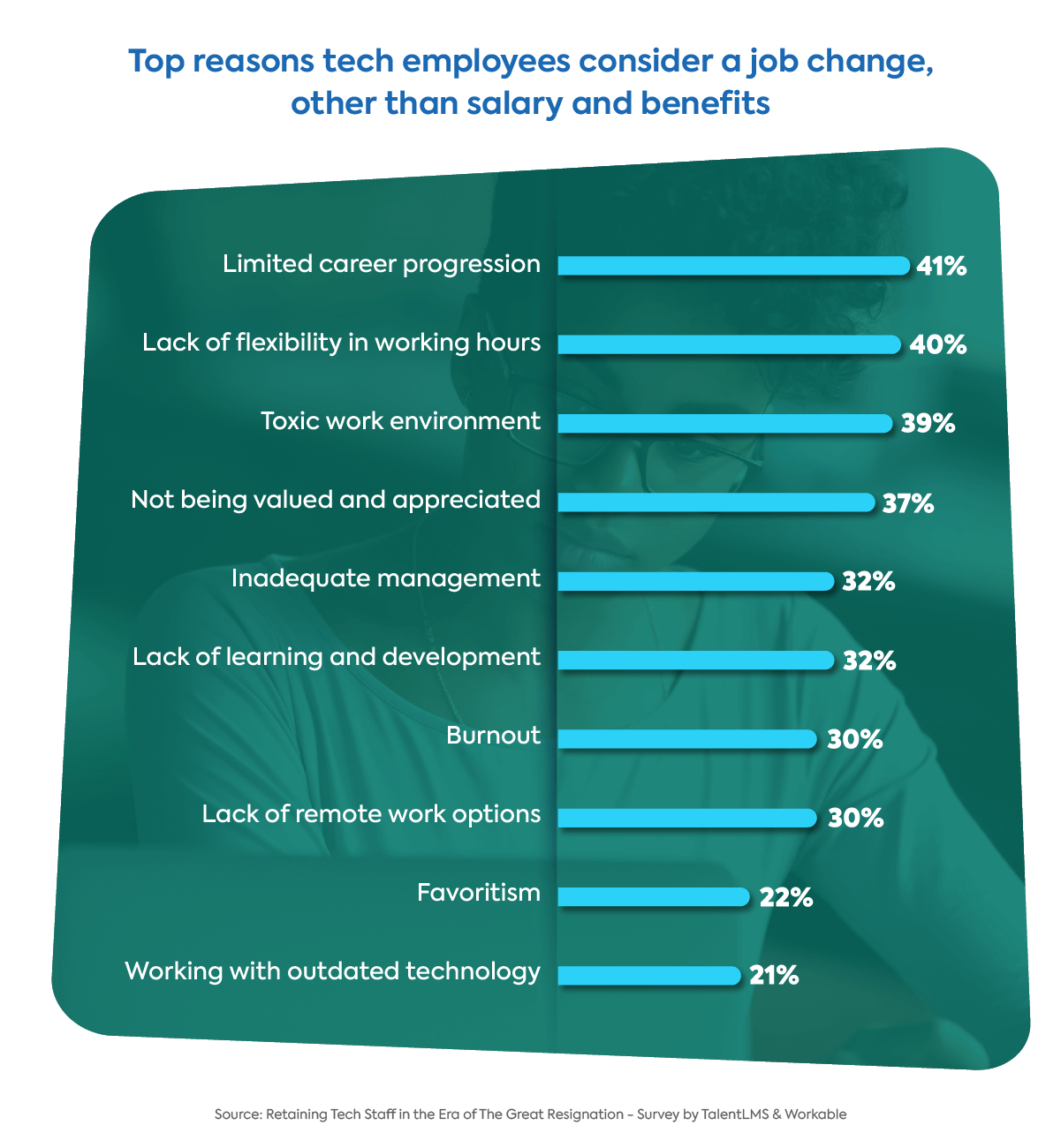
Therefore, companies that don’t offer that option risk paying the price.
A great example of this comes from Apple.
The electronics giant recently experienced a lot of backlash from its employees because of mandating them to return to the office after they’ve been working remotely due to the pandemic.
The company was reportedly considering making the change permanent, but after employees pushed back, they decided to postpone the decision.
Darren Murph, a head of Remote at GitLab, said he wasn’t surprised by the pushback, considering how many people have grown accustomed to working remotely and enjoying greater freedom as a result.
Plus, as he points out, this friction results from an unprecedented transfer of power and the realization that the way we have always done things doesn’t necessarily have to continue.
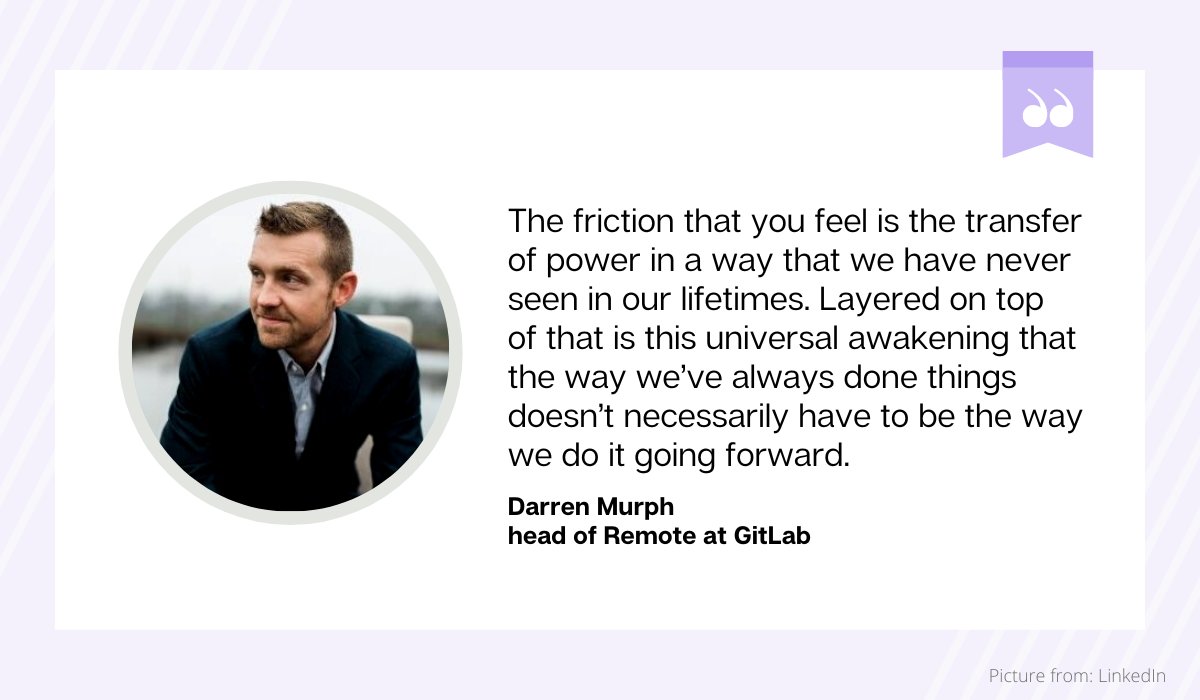
The same reason drove Jimme Hendrix, a Netherland-based software developer, to quit his job after the company he worked for decided to bring back everyone to the office. He said:
“During Covid I really started to see how much I enjoyed working from home.”
The bottom line here is that developers love working from home.
And they’re not ready to give up gained freedom just yet.
The cost of recruiting is high, so when you have good developers on board, it’s worth the effort keeping them around.
And if that means giving them the option to work remotely, you should enable them this possibility.
Conclusion
Remote work has some serious perks, but the best reason to do it is that it’s much better for companies and developers.
Remote employees are happier, more productive, and less likely to leave the company than their in-office counterparts.
Many software development companies have already realized this and moved toward a completely remote-friendly model.
Therefore, if you want to take your business to the next level, it would be a good idea to let your employees work remotely.





